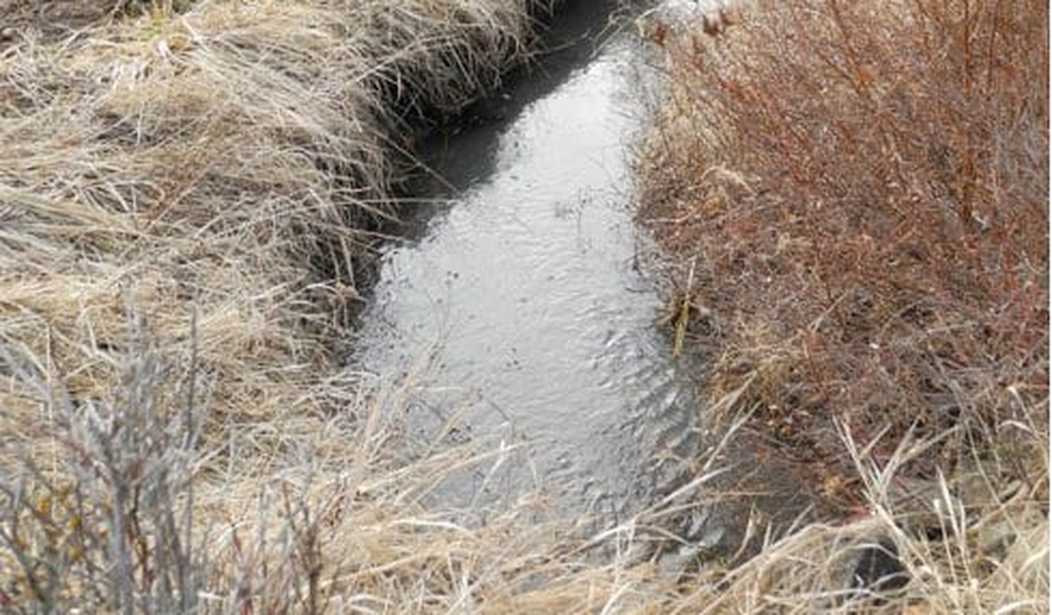WASHINGTON – Legislation aimed at blocking the Environmental Protection Agency’s effort to expand its regulatory authority over bodies of water for the purpose of limiting pollution has passed the Senate but it appears unlikely to survive an almost certain presidential veto.
The measure to disapprove the recently adopted Waters of the United States rule passed in a 53-44 vote with three Democrats crossing the aisle to oppose the regulatory expansion. It now heads to the House where it is likewise expected to pass before running into a White House-imposed blockade.
Sen. Joni Ernst (R-Iowa), the lead sponsor, characterized the regulation as “ill-conceived and harmful,” asserting that debate over the rule concerns “how much authority the federal government and unelected bureaucrats should have to regulate what is done on private land.”
“This rule is so complex and so ambiguous that folks in my state are concerned that any low spot on a farmer’s field, or a ditch, or a puddle after a rainstorm may now fall under the EPA’s watch,” Ernst said.
The EPA and the Army Corps of Engineers jointly produced the rule, popularly known as WOTUS, as a means to limit pollution in the nation’s rivers, lakes, streams and wetlands.
The regulation essentially expands the scope of the agency’s authority to regulate pollution affecting about 60 percent of the nation’s bodies of water. It is being promulgated under the Clean Water Act of 1972 and is intended to address a pair of confusing U.S. Supreme Court rulings regarding the federal government’s authority to regulate small streams and other areas like wetlands.
In announcing implementation of the rule last May, President Obama called it “another step towards protecting the waters that belong to all of us.”
“One in three Americans now gets drinking water from streams lacking clear protection, and businesses and industries that depend on clean water face uncertainty and delay, which costs our economy every day,” Obama said. “Too many of our waters have been left vulnerable to pollution.”
But the expansion drew opposition from agricultural and business groups, including the American Farm Bureau and the U.S. Chamber of Commerce, who argue that it will violate the rights of private property owners and stifle economic growth.
WOTUS attracted immediate lawsuits and its implementation has been placed on hold by the U.S. Sixth Circuit Court of Appeals in Cincinnati. The legislative action is intended to assure it never takes effect.
“While there are clear indications that this WOTUS rule is illegal and likely to be scrapped by the courts, that process could take years to play out and all at the expense of the average American,” Ernst said. “Let’s not wait around for the inevitable and force our farmers and small businesses to operate in the dark while they wait. Let’s fix this now and give American families the certainty they deserve.”
Without some action, Ernst said WOTUS “would give EPA the authority to expand its power over family farms, small businesses, ranchers and other landowners in our rural communities.”
Senate Republican Leader Mitch McConnell, of Kentucky, who has been engaged in a running battle with the EPA over clean air and clean water regulations, warned that the new rule “would place virtually all private property near a ditch, pothole or puddle under the thumb of federal bureaucrats.”
“This cynical, indefensible and unprecedented power grab would force citizens to seek federal permission before doing just about anything with their own property,” McConnell said. “Thirty-one states have already filed suit against this draconian regulation, and two federal courts have ruled that it is likely illegal.”
The White House has made it clear it opposes the Ernst legislation, issuing a statement that asserted EPA’s rulemaking is “grounded in science and the law, is essential to ensure clean water for future generations, and is responsive to calls for rulemaking from the Congress, industry, and community stakeholders as well as decisions of the U.S. Supreme Court.”
The final rule, the administration insisted, “has been through an extensive public engagement process.”
Senate Democratic Leader Harry Reid, of Nevada, accused majority Republicans of wasting the upper chamber’s time by engaging in “show votes,” fully knowing that Obama will veto any measure stopping the rule. The Ernst bill, he said would “nullify drinking water protections for 117 million Americans.”
“The Obama administration’s clean water rule will restore important safeguards that protect American water sources from pollution and contamination,” Reid said. “This landmark rule from the Obama Administration will finally resolve years of confusion and provide regulatory certainty for businesses, farmers, local governments and communities without creating any new permitting requirements and maintaining all previous exemptions and exclusions.”
But, Reid said, “Republicans in Congress are intent on undermining these important protections.”
The vote on the Ernst bill came only after Republicans failed to overcome a filibuster on legislation offered by Sen. John Barrasso (R-Wyo.), intended to rescind WOTUS and require the EPA to restart the regulatory process with additional input from farmers, ranchers, manufacturers and small businesses.
Barrasso said the provisions found in WOTUS “are sweeping, and will create unnecessary and uncertainty activities in communities across the country.”
“It’s bad for agriculture with the many methods it provides for federalizing previously state-controlled water,” Barrasso said. “States have made these decisions in the past. Now we’re adding another level of government bureaucracy. This rule is bad for agriculture. For those people who produce our food. Farmers, ranchers, and others are used to working with their states to protect their land and water under that you are own stewardship.”









Join the conversation as a VIP Member